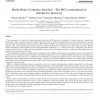Free Online Productivity Tools
i2Speak
i2Symbol
i2OCR
iTex2Img
iWeb2Print
iWeb2Shot
i2Type
iPdf2Split
iPdf2Merge
i2Bopomofo
i2Arabic
i2Style
i2Image
i2PDF
iLatex2Rtf
Sci2ools
127
click to vote
IJMMS
2007
2007
Berlin Brain-Computer Interface - The HCI communication channel for discovery
The investigation of innovative Human–Computer Interfaces (HCI) provides a challenge for future interaction research and development. Brain–Computer Interfaces (BCIs) exploit the ability of human communication and control bypassing the classical neuromuscular communication channels. In general, BCIs offer a possibility of communication for people with severe neuromuscular disorders, such as amyotrophic lateral sclerosis (ALS) or complete paralysis of all extremities due to high spinal cord injury. Beyond medical applications, a BCI conjunction with exciting multimedia applications, e.g., a dexterity discovery, could define a new level of control possibilities also for healthy customers decoding information directly from the user’s brain, as reflected in EEG signals which are recorded non-invasively from the scalp. This contribution introduces the Berlin Brain–Computer Interface (BBCI) and presents set-ups where the user is provided with intuitive control strategies in plausi...
Classical Neuromuscular Communication | Communication Channel | IJMMS 2007 | Intuitive Control Strategies |
| Added | 15 Dec 2010 |
| Updated | 15 Dec 2010 |
| Type | Journal |
| Year | 2007 |
| Where | IJMMS |
| Authors | Roman Krepki, Gabriel Curio, Benjamin Blankertz, Klaus-Robert Müller |
Comments (0)

